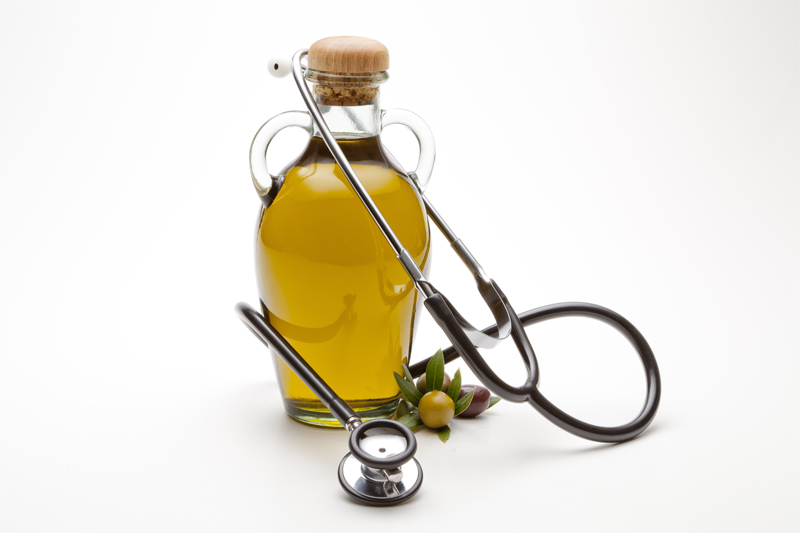
Here, discover 10 exciting health benefits of olive oil backed by science.
1. Promotes overall heart health.
Olive oil’s positive impact on cardiovascular health is well known. In a large 2013 study, people who followed a Mediterranean diet, which included 4 tablespoons of extra virgin olive oil per day, had a 31% reduced risk of experiencing a stroke, heart attack, or death from heart disease than participants eating a low-fat diet.
Several studies have also linked extra virgin olive oil to improvements in cholesterol and reduced blood pressure.
2. May reduce the risk of certain cancers.
Olive oil may be one reason cancer rates are lower in the Mediterranean region. A 2011 study found that women who consumed the most olive oil had a lower risk of breast cancer and cancers of the digestive system, like colon cancer. Other research has found that olive oil, along with other aspects of a Mediterranean diet, may reduce the risk of skin cancer, including melanoma.
Olive oil’s anti-cancer properties likely come from its potent polyphenol compounds.
3. Supports a healthy brain and memory.
Olive oil’s polyphenols, especially oleocanthal, may keep your memory sharp as you age. Findings of a 2019 animal study suggest that consumption of oleocanthal-rich extra virgin olive oil may slow or halt the progression of Alzheimer’s disease. The oleocanthal-rich EVOO was shown to restore the blood-brain barrier function and improve other aspects of brain health by reducing neuroinflammation.
4. Reduces inflammation and pain.
Olive oil may be a key element to fight of pain and inflammation. For one, olive oil is rich in monounsaturated fats, which have been shown to reduce inflammation, especially when eaten in place of saturated fats.
Studies also suggest that the polyphenol oleocanthal has the same anti-inflammatory characteristics to ibuprofen. Researchers speculate that consistent low doses of oleocanthal-rich foods, like EVOO, could reduce the risk for chronic inflammatory diseases.
5. Supports healthy weight loss.
Olive oil proves that fat can actually help you slim down. In a recent study, women with excess body fat who added 1.5 tablespoons of extra virgin olive oil to their breakfast experienced significantly greater weight loss and reduction in blood pressure than women consuming soybean oil. These findings support earlier research finding that a higher intake of olive oil over 28 months wasn’t associated with weight gain.
6. May boost mood and overall mental health.
Olive oil is a key element of a mood-boosting diet. In a 2019 study, researchers found that eating a Mediterranean-style diet (containing fruit, veggies, whole grains, fish, lean meats, tofu, beans, and 2 tbsp of EVOO per day) for 3 weeks reduced depression symptoms to a “normal” range. Other studies suggest olive oil’s oleic acid and polyphenols support the nervous system, making it a potential dietary intervention for depression and anxiety.
7. Promotes a healthy gut microbiome.
A 2019 research review found that the polyphenols in olive oil may reduce gut inflammation and improve immunity, making it beneficial for people with irritable bowel diseases like ulcerative colitis and Crohn’s.
One study included in the review found that consuming around 1.5 tablespoons of EVOO everyday may increase bifidobacteria, which is a type of healthy gut bacteria, and microbial metabolites responsible for antioxidant activity.
8. May boost immune health.
The immune system plays a role in everything–from cancer prevention to battling viruses, and olive oil may help it function more optimally. A 2015 study compared the effect of consuming 3 tablespoons of extra virgin olive oil per day vs 3 tablespoons of butter, soybean oil, or corn oil. Immune T-cells in the EVOO group were more activated and grew in number by about 50%, while the other group’s T-cells remained unchanged. Additionally, hydroxytyrosol, a polyphenol in olive oil, helps immune cells produce the anti-inflammatory compound interleukin-10.
9. Supports strong, healthy bones.
It’s not just milk that builds strong bones. In a 2018 study of about 500 women, there were increases in bone mineral density among those who are taking olive oil—even after adjusting for factors like calcium and vitamin D intake. Research suggests that olive oil polyphenols may stimulate mechanisms involved in the formation of the bones, the prevention of bone breakdown, and reducing inflammation and oxidative stress.
10. Helps prevent diabetes.
A diet rich in healthy fats like olive oil—along with a reduction in refined carbs—is important for the management and prevention of type 2 diabetes. A 2017 meta-analysis found that people consuming the most olive oil had, on average, a 16% reduced risk of developing type 2 diabetes as well as significant reductions in fasting blood sugar and HbA1c levels, which is an indicator of average blood glucose over two to three months.
How to find the healthiest olive oil.
Extra virgin olive oil is the healthiest olive oil you can buy, but not all EVOO is created equal. Here are a few things to consider:
- Olive oils labeled high-polyphenol or high-phenolic, especially if they have a certificate of analysis to prove their polyphenol levels, may pack a bigger health punch.
- Olive oils made from these varieties of olives are generally higher in health-promoting polyphenols: Koroneiki, Picual, Moraiolo, Coratina, Picholine, Manzanillo, and Chemlali
- Healthy EVOO can range in flavor from peppery and pungent (you may feel a subtle sting back of your throat) to smooth and buttery, but it should never smell or taste rancid.
Bottom line
Olive oil is a great source of good fats and health-promoting compounds, and it may even hold the secret to why people in the Mediterranean region seem to be the healthiest on the planet. To reap the benefits, invest in a high-quality EVOO and consume a few tablespoons per day.
Comments
comments